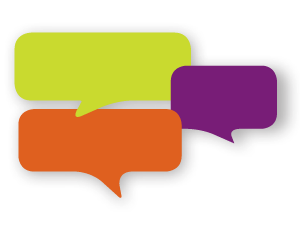Discussions from the magazine, website and social media

Online teamwork
In the last issue, Claire McDonnell explored the use of wikis to facilitate group collaboration and assessment. Lauren commented on the article on our website:
I completely agree with your claims about the use of wikis in the classroom. As a graduate student I used wikis and received effective, ample and quick feedback from colleagues and instructors. Two years ago I began using a wiki in my sophomore level high school chemistry class. The students were apprehensive at first, but after sufficient modelling and structured routines and practices, they thrived. Some students even expressed how much more comfortable they felt expressing their ideas in this format. My students that don’t normally participate, without prompting, made great efforts on the wiki. Additionally, they are getting experience writing and proofreading ... a great cross-curricular exercise.
The author, Claire McDonnell, replied:
It’s interesting that you mentioned that you had experienced using wikis as a graduate student before implementing them with your own students. I think it’s important for educators to have the opportunity to experience learning and teaching methods that are unfamiliar from the perspective of a student. That’s why I try to enrol on part-time courses on a reasonably regular basis.
Warming to PeerWise
In his most recent blog post for EiC, Michael Seery described his reservations with using PeerWise, a system that enables students to design their own assessment questions. Michael’s aim was to invite contributions from others who have used the system to challenge his own thinking.
A really useful contribution to the discussion came from Matt Bird, a first year chemistry student at the University of Nottingham:
We used PeerWise for part of our assessment. It accounted for 5% of one module, so it didn’t really matter how well we did in the long run. It was completely addictive. There are top five leaderboards and badges to earn, which lent a competitive feel to the activity. Your overall PeerWise score is determined by the number of questions you write, answer and comment on. Also, you rate the questions you answer so people writing poor questions wouldn’t receive high scores. Anybody can make an addition to the explanation so in general they are good.
The main thing that brought me back to the site was the competitive aspect. It is all anonymous so you don’t know who is who on the boards (or comments, which is good), but you can work out where your friends are by asking them about their scores. All in all, it was good fun and I found it useful as many of the topics came up in the exam – many in a similar style.
With regards to copying questions from the internet and textbook, I’m sure that did happen. The way I see it is the marks are for engaging with the system for revision. If the question is from a textbook, then you have still showed you have read the textbook and thought up possible wrong answers. It is more about engagement than it is about writing hundreds of super high quality questions.
Revolutionary change
Last issue’s editorial was written by the chair of EiC’s editorial board, David Read. He discussed the announcement that practical exams will be removed from the next generation of A-level science qualifications. David wondered: if he had still been in the classroom and had been released from the shackles of assessment, would he have been more creative in his use of practical work?
On Twitter, Alastair Gittner, a science teacher from the UK, commented:
Assessment shouldn’t shackle classrooms but a league table based on their results might
Kelly Cleavinger, a teacher from Louiseville, US, said:
I would agree that formal assessments in the science disciplines could be eliminated. However, I would ask that the students have some type of culminating event that demonstrates their mastery of content. I have seen in my classrooms here in Kentucky that assigning theme-based multidisciplinary projects such as sustainability (functioning aquaponic gardens), water quality and biodiversity studies (to include a statistical presentation of data) and hydrodynamic studies of local streams (with analysis and researched-based predictions), with deliverables that are more than a PowerPoint presentation, are more valuable than a standardised test. In my opinion, asking teachers to prepare students for annual testing removes imagination in the classroom.
In the UK Education group on LinkedIn, Kevin Hewitson offered his opinion:
If we agree that learning (not just ‘knowing’) is a creative process (having new ideas and insights) then the question becomes ‘Could removing assessment boost learning?’. A very interesting question! In my own experience I would have to say a rather loud ‘yes’. However there is a caveat – it depends on the timing and purpose of the assessment. Teaching intrinsically involves assessment, not to do so is little more than lecturing.
I know that the results of an assessment can be either devastating or motivating to the learner. Externally set assessments that do not take into account timing, recent learning experiences, mindset, progress, appropriate challenge, question language (mindful learning issues) and recent insights demonstrated by the learner only hinder learning. They hinder it because they detract from, and take time away from, the very teaching processes (including internal assessment) that supports all of these things.
What do you think? Would abandoning formal practical assessment make you more creative in the classroom? Join the discussion and let us know.
Do you have something else you’d like to get off your chest? Visit Talk Chemistry and start a discussion with chemistry teachers around the world.
Correction
The state symbol for ammonium chloride in the article 'In uncertain terms' should be (s). Thank you to P G Wright for bringing this to our attention.






No comments yet